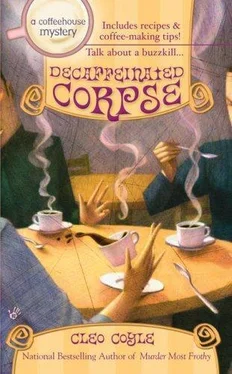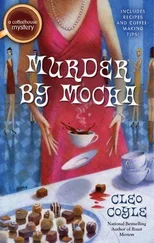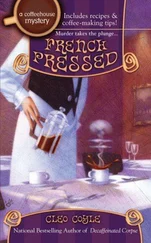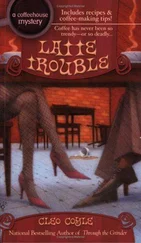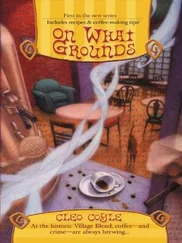Клео Коул - Decaffeinated Corpse
Здесь есть возможность читать онлайн «Клео Коул - Decaffeinated Corpse» весь текст электронной книги совершенно бесплатно (целиком полную версию без сокращений). В некоторых случаях можно слушать аудио, скачать через торрент в формате fb2 и присутствует краткое содержание. Год выпуска: 2007, ISBN: 2007, Издательство: Berkley, Жанр: Детектив, на английском языке. Описание произведения, (предисловие) а так же отзывы посетителей доступны на портале библиотеки ЛибКат.
- Название:Decaffeinated Corpse
- Автор:
- Издательство:Berkley
- Жанр:
- Год:2007
- ISBN:978-1-436-25369-7
- Рейтинг книги:5 / 5. Голосов: 1
-
Избранное:Добавить в избранное
- Отзывы:
-
Ваша оценка:
- 100
- 1
- 2
- 3
- 4
- 5
Decaffeinated Corpse: краткое содержание, описание и аннотация
Предлагаем к чтению аннотацию, описание, краткое содержание или предисловие (зависит от того, что написал сам автор книги «Decaffeinated Corpse»). Если вы не нашли необходимую информацию о книге — напишите в комментариях, мы постараемся отыскать её.
Decaffeinated Corpse — читать онлайн бесплатно полную книгу (весь текст) целиком
Ниже представлен текст книги, разбитый по страницам. Система сохранения места последней прочитанной страницы, позволяет с удобством читать онлайн бесплатно книгу «Decaffeinated Corpse», без необходимости каждый раз заново искать на чём Вы остановились. Поставьте закладку, и сможете в любой момент перейти на страницу, на которой закончили чтение.
Интервал:
Закладка:
“She’s cut it. And she’s married. She’s Ellie Lassiter now.”
“You and Matt went out with those two, didn’t you? A lot of double dates with Ric and Ellie?”
“That’s right.”
“Federico must be one of Matt’s oldest friends.”
I nodded and considered blurting out what I’d just learned from Ric, but I knew the smuggled cutting alone wouldn’t have overly concerned Madame. She was an honest businesswoman, but she was a canny one, too. During her decades of running our Manhattan business, she’d dealt with corrupt inspectors, mobbed-up garbage haulers, and underhanded rivals. The letter of the law was one thing, survival was another, and the woman wasn’t going to blanch at a few sidesteps of regulations in sending a little ol’ coffee tree cutting from one country to another. At the most, she’d be amused, and probably quote me the long history of coffee plant smuggling that I already knew.
Ric’s mugging, his stolen keycard, and the possibility of attempted murder, however, were something else. But I still held my tongue. Ellie Shaw wasn’t the only one who knew more than me about Federico Gostwick. Madame had known him for years, too, and I wanted her unbiased opinion.
“When you say Ric is one of Matt’s oldest friends, you mean childhood, don’t you?” I asked. “Years ago, Matt mentioned to me that he and Ric used to play together?”
“Oh, yes. Matt’s father was good friends with Ric’s father, and he often took Matt with him on trips to the Gostwick plantation on Costa Gravas. I went with them many times.”
“What did you think of Ric’s birthplace?”
Madame smiled. “Paradise.”
“Really?”
“Oh, yes. You know, Matt’s father was a true romantic. On our trips to Costa Gravas, he’d always arrange for Matt to stay with the Gostwicks for a day or two so he and I could share some time alone on the island.” Leaning back against the car seat, she closed her eyes. “I can still see Antonio on that beach in his swim trunks, all that white sugar sand, the clear aquamarine bay stretching out behind him...” She sighed again. “Matt’s father was such a handsome, passionate man... even after all these years, after marrying and losing Pierre, I still miss him.”
“Of course you do.”
“Sometimes my years with Antonio feel like a dream... but then I see my son, and I know they weren’t.” Madame opened her eyes. “Matt’s the evidence, you see, Clare? The evidence of those years of love.”
I shifted uncomfortably behind the steering wheel and cracked my window. Not only was the bright sun overheating the car, Madame’s voice seemed irritatingly vested with meaning for me, but I wasn’t catching what she was throwing, so I cleared my throat and politely posed my next question.
“I’m not really that familiar with Costa Gravas... if there were beaches on the island, then how flat was the land? Where did Ric’s family grow coffee?”
“In the mountains, of course,” she said. “The island had a range like Jamaica’s, between four- and five-thousand feet—a splendid altitude for cultivating arabica ...”
Madame was right, of course. Arabica coffee plants grew best at elevations between three and six thousand feet. “High-grown, high quality” was how some put it in the trade.
She closed her eyes again. “What a paradise that island was...”
By now, we were driving east on Houston (pronounced “How-stun” on pain of being corrected by snippy carpet-baggers eager to prove their New York savvy). And I’d changed my resistant attitude about Madame coming with me to Brooklyn. She was clearly going to be a help as far as info on Ric.
“About the Gostwick family,” I said, “I was wondering if you could tell me something...”
Madame opened her eyes again. “What would you like to know?”
“If life on Costa Gravas was so wonderful, then why did Ric’s family relocate to Brazil?”
Madame stared at me as if I’d just suggested we replace our thirty-five dollar-a-pound, single-origin Jamaica Blue Mountain with Folgers instant crystals.
“You don’t know?”
“No.”
“Matt didn’t share that with you?”
“Matt and I were divorced then. The last thing I remember about Ric was his over-staying his education visa for Ellie, then returning to Costa Gravas anyway—and without proposing, which I also remember had absolutely devastated her.”
Madame nodded. “Then you never heard the story.”
“What story?”
“Ric’s family didn’t move out of Costa Gravas voluntarily. The government turned into a socialist dictatorship practically overnight, and all private farms and companies were seized.”
“You mean like Cuba, in Godfather II ?”
“I mean like Cuba in reality , dear. Federico’s father had been an outspoken opponent of Victor Hernandez, who had close ties to Castro. The man’s military swept over Costa Gravas. So the family fled to Brazil. It’s a good thing too. Hernandez could have imprisoned Ric’s father... or worse.”
Now I felt like a geopolitical idiot.
I could only say, in defense of my ignorance, that I was overwhelmed those years with concerns closer to home (e.g. raising my daughter, keeping food on the table, paying New Jersey Power and Lighting somewhere close to on time). Regardless of Costa Gravas’ political history, however, I knew one thing—quality coffee no longer came off that little island.
Farming coffee was an art as exacting as any. Years ago, the trade journals had downgraded the quality of Costa Gravas cherries as well as their crop yields. I’d never researched why. I’d simply focused on other regions and coffee crops.
“Why exactly did Ric’s family end up in Brazil?”
“A relative down there had some lands, and he gave them a section of it to farm.”
“So that’s why...” I murmured, turning south onto Broadway.
“What?” Madame asked. “That’s why what?”
“That’s why Ric buckled down... I mean, his botanical breakthrough came after his family lost their farm on Costa Gravas.”
“What are you getting at?”
“I just couldn’t reconcile a man who’d painstakingly create a new hybrid plant with the sort of carefree playboy Ric had been during his college years. You know that Brazilian term Matt uses?”
“A carioca ?”
“That’s the one.”
Madame sighed. “Alas, my son’s favorite foreign word.” “We’re talking about Ric.”
“Not just.”
“What do you mean?”
“I mean, I want to talk to you about Matt. That’s why I was coming to see you.”
“Okay...” I said, curious at the suddenly hushed tone. “What did you want to talk about?”
“That woman.”
“Excuse me?”
Thinking my ex-mother-in-law was speaking about a pedestrian, I glanced out the window. To our left was Little Italy, although lately it was hard to tell. Swanky Soho (to our right) had jumped the avenue, bringing its chic boutiques and trendy watering holes into the neighborhood of old school Italian restaurants and mirror-walled patisseries.
“Which woman?”
Madame saw me searching the crowded sidewalk and shook her head. “No, dear, not out there...”
“Where?”
“Right under your nose, that’s where!”
“Right under my... ?”
“Breanne Summour.”
By this time, my reaction to the woman was an autonomic response. At the sound of her name, my grip on the steering wheel tightened.
“What about her?” I asked levelly.
“I know Matt’s been networking with her.”
I laughed.
“What’s so funny?” Madame sniffed. “That’s the word he used.”
“Networking?”
“Yes,” said Madame. “I’ve seen their photos together in the tony magazines—you know, those charity party mug shots? I’ve met her a few times, too, and Matt continually tells me it’s a casual thing, a collegial relationship.”
Читать дальшеИнтервал:
Закладка:
Похожие книги на «Decaffeinated Corpse»
Представляем Вашему вниманию похожие книги на «Decaffeinated Corpse» списком для выбора. Мы отобрали схожую по названию и смыслу литературу в надежде предоставить читателям больше вариантов отыскать новые, интересные, ещё непрочитанные произведения.
Обсуждение, отзывы о книге «Decaffeinated Corpse» и просто собственные мнения читателей. Оставьте ваши комментарии, напишите, что Вы думаете о произведении, его смысле или главных героях. Укажите что конкретно понравилось, а что нет, и почему Вы так считаете.
